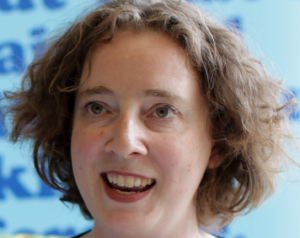Tania Hershman: I decided that I was going to interview myself and ask the questions I’d always wanted to ask or been scared someone would ask. How does that sound?
Tania Hershman: That sounds fine, fire away.
TH: So, Dissolving, what’s that all about? Is it even a story?
TH: Ha! Well, I never explain my stories, especially the really tiny ones, because they are really whatever the reader wants them to be.
TH: Oh come on, you must know what it means! Why don’t you want to tell us?
TH: Look, there’s a woman, there’s a lover, he’s not answering, end of story. It’s not one of my more cryptic pieces.
TH: It is a bit, well, like a poem, isn’t it, maybe? Or something else? Is it a poem? What is it?
TH: Another question I’d rather not answer.
TH: You’re an annoying interviewee.
TH: You’re fairly annoying too. Look, does it matter if it’s called a short short story, flash fiction, microfiction, a prose poem? It’s all just writing, the rest are labels. I’m delighted that r.kv.r.y liked it enough to want to publish it, that’s the main thing, that it’s an arrangement of words that spoke to someone else.
TH: Okay, fine. How does it fit into the r.kv.r.y “shorts on survival” section?
TH: This is her way of surviving a relationship that she feels is verging on the imaginary. She gets drunk, she does something she’ll probably regret, but something she needs to do. I think we all know that feeling. I think we all know what it is like to dissolve, to come apart into our constituent atoms. For me, this combines tragedy with hope. She will survive, she may be altered but she is not defeated.

TH: That’s nice. I like that. Well said. Do you think you write about survival a lot?
TH: Yes, thinking about it, I probably do. Surviving failed love, surviving difficult parents, surviving unpleasant children, surviving society’s expectations. Hmm, yup, a lot of my stories deal with it, in some way. Actually, I think that for me, and I suspect for many writers, writing is survival. This is me playing out scenarios, testing to see what might work, what might not, like “thought experiments” in science, where you don’t do the actual experiment, you think it. I also believe that the role of stories is to help us survive. The first person who told the story about almost being eaten by a woolly mammoth, that would help everyone else avoid the same fate. But the story had/has to be gripping enough so that people listen. I think “story” is part of our highly-evolved survival strategy.
TH: Every kind of story?
TH: Look, I’m no academic, I don’t have a well-thought-out theory on this, but I do wonder why society loves stories, in all forms – TV, films, books etc… What do we get from it? We get to put ourselves in others’ shoes, and maybe, on a purely evolutionary level, this helps us get by in the world, make sense of the world, of experiences we haven’t had yet. Oy, I sound so serious!
TH: Tell me something funny.
TH: I’m really bad at jokes.
TH: Believe me, I know that. Okay, last thing: did I hear you have a book coming out?
TH: You heard right, I do – My Mother Was An Upright Piano: Fictions, will be published in May 2012 by Tangent Books and will contain 55 very short fictions, including Dissolving.
TH: “Fictions”, what does that mean? Why not “short stories”?
TH: I feel like even calling them “short stories” is a label. The one thing I can say about them is that they are fiction. Definitely. I thought I’d leave the labelling to someone else!
TH: I do think sometimes you’re a bit crazy.
TH: That’s charming. Thanks. And thanks for having me. Next time, I’ll get a better interviewer.



Pingback: “Dissolving” by Tania Hershman | Rkvry Quarterly Literary Journal